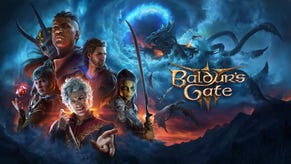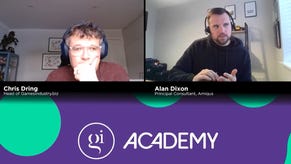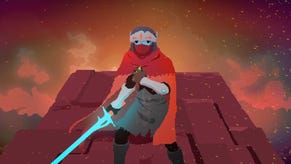Five lessons for developers from the GamesIndustry.biz Investment Summit
Panelists and speakers offer tips and advice for pitching game ideas to publishers and investors
Last week, the GamesIndustry.biz Investment Summit in Boston hosted more than 100 developers, 67 of whom sat down with 26 publishers and investors to pitch their games for possible funding.
Ahead of those meetings, several panelists and speakers took the microphone to offer insight, analysis, and advice for those preparing to pitch both at and beyond the summit.
Want to crowdfund? Build a community first
"The more projects you run on Kickstarter, the more likely it is that you'll be successful, and the more likely it is that you'll be successful sooner," said Kickstarter's Anya Combs in her opening Investment Summit talk. "Part of the reason for that is that you've essentially built trust with the community. You're essentially saying you can launch projects and come out with the thing you said you were going to come out with. You're building an additional community on Kickstarter."
Combs gave several examples of campaigns where this tactic had worked, including Beautiful Glitch's Monster Prom 2 -- a sequel to its crowdfunded predecessor -- and Kitfox's Boyfriend Dungeon.
In the case of the latter, Combs said Kitfox's campaign benefited from the work of the studio's community manager, Victoria Tran.
"She's very good at galvanizing communities," Combs said. "Community managers are very important for Kickstarter games. That doesn't necessarily mean you need to hire a community manager, but having someone that's able to manage your community, respond to every comment, post updates, get people engaged, is really beneficial.
"Victoria also spent two years going to conferences, showing the game off, and getting people hyped about the project, so they spent a significant amount of time riding the success of their first Kickstarter going into their second Kickstarter. And they did extremely well."
It's okay not to know what you're doing -- no one does
In a fireside chat with independent developers Chandana Ekanayake and Éric Chahi, Funomena co-founder Robin Hunicke acknowledged that the number one challenge of striking out to run her own business was having no idea at all what to do.
"I was really stupid," she said. "I had no idea what it meant to run a business. I had never done it. For example, I don't like to think about taxes and finances, and yet that seemed to be the only thing I could do for like, two years. So you learn a lot of stuff that you don't want to know, you feel incompetent constantly, and then at some point you either go out of business or you don't."
But Hunicke also emphasized that developers who want to build their own companies shouldn't let that discourage them.
"After a while you realize that everyone else is faking it too, and anyone who is still going is a super awesome faker and you never play poker with them. Nobody ever knows what they're doing when they start because you can't learn it any other way than by doing it. There's literally no other way to learn how to do your business because you're going to have a personal impact on the business."
Don't expect a "yes" the first time you pitch a game
In the same fireside chat, Ekanayake mentioned that he was at the Investment Summit this year to pitch once more, following the success of Outerloop Games' first title, Falcon Age.
But this time, he was doing something a bit unconventional.
"I have three pitches," he said. "They always tell you to pick one, because it'll seem like you're wishy-washy with multiple pitches. The first one is what people would expect us to do after our first game -- it's safe, and it's marketable. The second is a little more unique, the third one is way out there.
"Mostly, I wanted to do this to get feedback. The biggest problem for any game studio is just getting people to care about the thing you're making at all. There are a lot of options. I want to do that early from a funding perspective. Are these games interesting to anybody? And which ones? It's not a proper pitch -- it's just rough, early things, but the feedback I've gotten from all the partners I've pitched to is like just having a conversation. We'll talk again later. It's worked out really well for us."
Hunicke added: "If you walk in expecting to get a 'yes' right then and walk away with a signed piece of paper, you're setting yourself up for a huge disappointment. Especially at a show like PAX or GDC where they're seeing hundreds of people. You have to think about the human person you're talking to, and see them as a person and not a giant bank account."
Make sure you're pursuing the right kind of funding
At the close of the Investment Summit, a panel consisting of Combs, Velen Ventures' Guha Bala, Richard Browne from Digital Extremes, and David Kaye from Snapshot Games offered developers preparing for one-on-one meetings advice on what to expect from different funding avenues.
"You give up certain things by coming to a publisher. It depends massively on who you go to"
Richard Browne
Both Combs and Kaye encouraged those who were interested to pursue crowdfunding, but cautioned that it wasn't right for everyone.
"As your project gets larger and more expensive and there's greater uncertainty around what the final product's going to look like, crowdfunding gets increasingly worse as an option," said Kaye. "You are trying to figure out how to fulfill promises you didn't really know the full consequences of when you made them."
Kaye also praised platform exclusivity deals and the lucrative financial terms they offer, as well as strategic partnerships with subscription services like Xbox Game Pass or Apple Arcade as supplements to other funding options.
Brown added that publishers are usually the best choice for those who don't just need funding, but also assistance with other elements of production.
"The reason to approach a publisher is because you understand that you can't do everything, and you don't want to do everything, and the scale of the project requires everything," he said. "You give up certain things by coming to a publisher. It depends massively on who you go to.
"There's an element of control you give up in your creative process in order to get access to marketing and sales and everything else that goes with that. And we're in a position where we can help. We can help market your product, we can help you get your audience, and allow you to stay focused on building a game, which generally is most people's passion."
Finally, Bala cautioned careful planning when looking at different types of investments, with an eye toward the long term future of a company beyond a single project.
"From a venture investment or an equity-based investment viewpoint, you want to pick the best partner to help you build your company for whatever goals you have," he said. "You could have an equity investor who in three to four years wants to flip that fund and get an exit. If your goal is to sell in that period of time, that could be a good fit because they may be really well-networked to the transaction opportunities you're seeking.
"Focus on how great what you're doing is and not how bad other things are"
Richard Browne
"If your goal is to develop a high cash flow business -- say a live game that throws out X amount of income and maintains a dividends stream -- you want an equity investor that's aligned with that. Strategic investments can be very useful because they don't necessarily have an exit in mind, but good alignments in mind. There are all different flavors."
Think before you pitch
Finally, the panelists offered brief nuggets of advice for developers going into pitch meetings of all types.
Combs offered: "One of the pitfalls you can fall into is over-promising. It's okay to say, 'This is the game I want to make and I'm excited to make it'. You don't have to go over that. Just stick with the project that you want to make."
Browne had two suggestions.
"Focus on how great what you're doing is and not how bad other things are," he said. "Don't say 'these four games are rubbish' or 'these four games don't work'. Games have sold billions in that genre, so that doesn't really resonate. I want to hear positivity, above anything else, about why you're better or why you think this is great, or how you're taking the best parts of other things.
"The other thing that I'm slightly biased about is, focus on a player's time. Time is more important than money, and it's getting worse and worse. The most amazing thing I've seen with my kids is how much entertainment they can get, and most of it is free or perceived free -- Netflix is a perceived free product. You're fighting for people's time. Half the reason people pick up free-to-play games is it removes the barrier. There is no barrier. You don't have to pay $20, you can just play the game. If we can grab your time and keep your time, then we can make money."
Finally, Kaye advised a bit of humility.
"The easiest kind of project for someone to say yes to is something that already exists, but is a little bit different," he said. "Every so often, someone comes along and creates Minecraft, but that happens very rarely, and most likely that's not your game. If you really want to get a game funded, help the person you're talking to see how it's similar to things people are already paying money for, but is different enough that you're going to carve out your own unique space."








